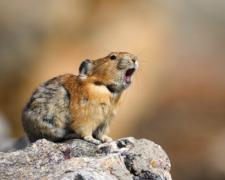Wildlife, Climate Change and the American Clean Energy Act
 In June, we offered up some information about the Waxman-Markey Climate Change Bill – aka. the American Clean Energy and Security Act, HR 2454. As we stated in that original post, our hope was to make our readers aware of the valuable protections the bill included for wildlife corridors. Our on-going environmental campaign, Freedom to Roam, is focused on exactly that: preserving critical migration corridors so wildlife can have freedom to roam. The ability to migrate freely is key to the survival for much of our country's wildlife.
In June, we offered up some information about the Waxman-Markey Climate Change Bill – aka. the American Clean Energy and Security Act, HR 2454. As we stated in that original post, our hope was to make our readers aware of the valuable protections the bill included for wildlife corridors. Our on-going environmental campaign, Freedom to Roam, is focused on exactly that: preserving critical migration corridors so wildlife can have freedom to roam. The ability to migrate freely is key to the survival for much of our country's wildlife.
The original post touched off quite a debate, and gave rise to questions about our support of Waxman-Markey. Our Environmental Editor is here with some responses to those questions and an update about where we are in our fight for Freedom to Roam.
________________________________________________________________
[Photo: From The Wilderness Society website, A pika, which is a speciesthreatened by global warming, in the wild. Photo by William C. Gladish]
We have aparticular interest in the provisions in HR 2454 supporting wildlife corridorsand protection of migratory routes for wildlife. Specifically:
- TheNatural Resources Climate Change Adaptation Fund, which will provide additionalmoney for numerous state and federal conservation programs to assist fish andwildlife in adapting to the effects of climate change.
- TheNational Wildlife Habitat and Corridors Information Program, which establishesa new program in the Department of the Interior to support states' and tribes'efforts to understand and map fish and wildlife habitat migration corridors,and to expand the use of computer database tools for wildlife management.
- Landand Water Conservation Fund, which protects properties around the country thatare important to fish and wildlife.
The United States is home to many species of wildlifethat depend on wide open spaces for migration. The ability to move unimpededacross the landscape is essential to the conservation of pronghorn, salmon,elk, migratory birds, ocelot, sage grouse, and many other animals. The WesternGovernors' Association, state and federal agencies, conservation groups,sportsmen, ranchers, and many others recognize the importance of protectingthese vital wildlife corridors, especially because of the impending problemscaused by climate change.
HR 2454 passed the House, as many of you know. The Senateis likely to take up a version this fall.
We urge our readers to look at the Environmental Protection Agency'sanalysis of HR 2454's cost toconsumers:http://www.epa.gov/climatechange/economics/economicanalyses.html#hr2452
Also, take a look at the Union of Concerned Scientistsfor information on climate change.
